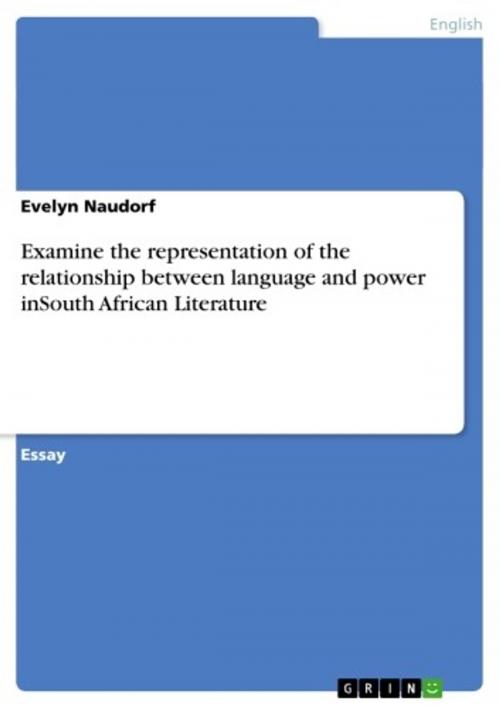Examine the representation of the relationship between language and power inSouth African Literature
Fiction & Literature, Literary Theory & Criticism, British| Author: | Evelyn Naudorf | ISBN: | 9783638191159 |
| Publisher: | GRIN Publishing | Publication: | May 27, 2003 |
| Imprint: | GRIN Publishing | Language: | English |
| Author: | Evelyn Naudorf |
| ISBN: | 9783638191159 |
| Publisher: | GRIN Publishing |
| Publication: | May 27, 2003 |
| Imprint: | GRIN Publishing |
| Language: | English |
Essay from the year 2001 in the subject English Language and Literature Studies - Literature, grade: B, University of London (Faculty of English Literature), course: Literature in History: Race and Subjectivity in South African Writing, 14 entries in the bibliography, language: English, abstract: 'The choice of language and the use to which language is put is central to a people's definition of themselves in relation to their natural and social environment, indeed in relation to the entire universe.'1 This quote by the Kenyan writer Ngugi expresses the exceedingly important relationship between language and the individual in general. This relationship is gaining even more importance for a continent such as Africa, in which large parts of the native population were oppressed by European colonial powers for centuries. One important instrument of oppression was definitely language and the feeling of European superiority resulting out of cultural traditions, such as literature. In South Africa, where two major colonial powers were fighting for supremacy and many different native ethnic groups were combined in one state, the question of language would almost naturally provoke conflicts and crisis. In this essay, I should like to have a closer look at this delicate relationship between language and power in South African literature with the example of a Black and a White African writer, Sol T. Plaatje and Nadine Gordimer. In his historical overview, Leonard Thompson already describes the South Africa of the 18th century as a 'linguistic Babel'2. Afrikaans, a simplified form of Dutch and at first only used in oral communication, would gradually develop into the lingua franca of South Africa. Today, its greatest competitor among European languages is English and both languages, together with nine African languages, belong to the eleven official languages of the postapartheid South African State. The right of every South African to use the language of his or her choice is now embedded in the constitution. However, the situation of having eleven official languages is truly unique world-wide. One of the most pressing question is whether there is a necessity to agree on a single language as the official one, with the other ten languages receiving an equally high status, in order to support the current process of nation-building? If so, should it be English, Afrikaans or one of the African languages? [...] 1 Ngugi wa Thiong'o. Decolonising the Mind, page 4
Essay from the year 2001 in the subject English Language and Literature Studies - Literature, grade: B, University of London (Faculty of English Literature), course: Literature in History: Race and Subjectivity in South African Writing, 14 entries in the bibliography, language: English, abstract: 'The choice of language and the use to which language is put is central to a people's definition of themselves in relation to their natural and social environment, indeed in relation to the entire universe.'1 This quote by the Kenyan writer Ngugi expresses the exceedingly important relationship between language and the individual in general. This relationship is gaining even more importance for a continent such as Africa, in which large parts of the native population were oppressed by European colonial powers for centuries. One important instrument of oppression was definitely language and the feeling of European superiority resulting out of cultural traditions, such as literature. In South Africa, where two major colonial powers were fighting for supremacy and many different native ethnic groups were combined in one state, the question of language would almost naturally provoke conflicts and crisis. In this essay, I should like to have a closer look at this delicate relationship between language and power in South African literature with the example of a Black and a White African writer, Sol T. Plaatje and Nadine Gordimer. In his historical overview, Leonard Thompson already describes the South Africa of the 18th century as a 'linguistic Babel'2. Afrikaans, a simplified form of Dutch and at first only used in oral communication, would gradually develop into the lingua franca of South Africa. Today, its greatest competitor among European languages is English and both languages, together with nine African languages, belong to the eleven official languages of the postapartheid South African State. The right of every South African to use the language of his or her choice is now embedded in the constitution. However, the situation of having eleven official languages is truly unique world-wide. One of the most pressing question is whether there is a necessity to agree on a single language as the official one, with the other ten languages receiving an equally high status, in order to support the current process of nation-building? If so, should it be English, Afrikaans or one of the African languages? [...] 1 Ngugi wa Thiong'o. Decolonising the Mind, page 4















